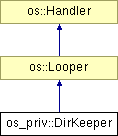
Inheritance diagram for os_priv::DirKeeper::

Public Types | |
| enum | { M_CHANGE_DIR = 1, M_COPY_FILES, M_MOVE_FILES, M_DELETE_FILES, M_RENAME_FILES, M_ENTRIES_ADDED, M_ENTRIES_REMOVED, M_ENTRIES_UPDATED } |
Public Methods | |
| DirKeeper (const Messenger &cTarget, const std::string &cPath) | |
| virtual void | HandleMessage (Message *pcMessage) |
| Handle a message targeted at this handler. More... | |
| virtual bool | Idle () |
| Hook called each time the message queue is drained. More... | |
|
|
|
|
|||||||||||||||
|
|
|
|
Reimplemented from os::Handler. |
|
|
Reimplemented from os::Looper. |
 1.2.9.1 written by Dimitri van Heesch,
© 1997-2001
1.2.9.1 written by Dimitri van Heesch,
© 1997-2001